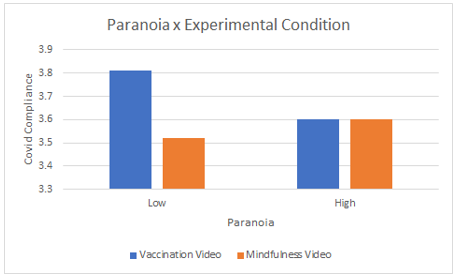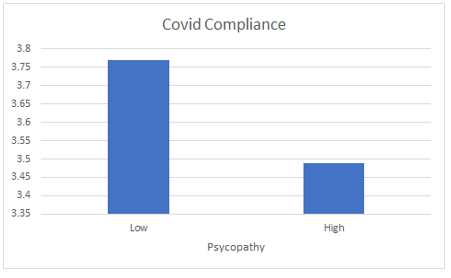Alise Bennett, Savannah Brown, Emily Gabrielian, & Alyssa Mattson (Advisor: Dr. Chris Buchholz)
Background
A little over a year ago, our world was quickly turned upside down once the news broke that we were heading into a global pandemic due to the coronavirus. With the rise of the pandemic, we also saw a rise in beliefs in conspiracy theories related to the coronavirus. COVID-19 skepticism became extremely present across the United States as some people demonstrated that they did not believe in the seriousness of the virus or that the pandemic was a hoax (Latkin et al., 2021). Recent research has demonstrated that COVID-19 skepticism is strongly associated with a decrease in engagement in COVID-19 prevention behaviors, such as isolating at home, social distancing, and wearing a face mask (Latkin et al., 2021).
Additionally, the research conducted on COVID-19 skepticism noted that the skepticism was associated with political conservation because there was a relationship between the sources of news that individuals consumed, the negative attitudes towards government spending on public health, and believing in conspiracy theories (Latkin et al., 2021). This current study aims to examine the relationship between paranoia levels and compliance in COVID-19 guidelines, such as wearing facial coverings and social distancing, in order to better understand the conspiracy theories surrounding the coronavirus. The possible limitations that may be present throughout this study are that we used a convenience sample from the Roanoke College student population, meaning that our data is not representative of the general population. Additionally, it is possible that when we were analyzing the data that we overlooked certain responses that may have been associated with the objective of the study. Overall, the findings of this study may reveal how paranoia contributes to these greater sociological problems as well as how to effectively address conspiratorial thinking as it affects our daily lives.
Method
Participants. 96 participants were sourced from either INQ-260 Psychology or Psychology 101 classes at Roanoke College. The students were notified about the survey through SONA, a subject pool software, and were given credit for completing the survey thoroughly and fully.
Materials. We used a survey platform called Qualtrics to build and conduct the following survey:
- Experimental condition: Participants were assigned to one of two conditions: an experimental condition (a short video from John Hopkins University on COVID-19 vaccinations), or a control condition (a short video from Harvard University on mindfulness.)
Following the video, all participants were directed to the main survey:
- Paranoia scale: a 10-item scale assessing paranoid tendencies.
- Dark triad scale (Jonastan and Webster, 2010): a 12-item scale assessing the three dark triad traits, such as narcissism, Machiavellianism, and psychopathy.
- Covid Compliance scale: an 11-item scale created based on the Health Belief Model assessing compliance with COVID-19 public health guidance. Additional questions included whether participants had previously contacted COVID-19 and their access to protective measures.
Procedure. The survey was live for a roughly three-week period. The participants were randomly assigned to one of two experimental conditions (videos). After finishing the video, participants will move on to the questionnaire part of the survey. In this section, participants will answer a series of questions ranging from personality and paranoia to questions regarding COVID-19 prevention practices engaged in. At the end of the survey, participants were given the option to redirect to another survey to enter personal information to receive credit. Following the data collection period, data was analyzed and interpreted by our group.
Results
A 2 x 2 between-subjects analysis of variance (ANOVA) was conducted to examine the effects of paranoia on compliance with COVID-19 public health guidance. It was predicted that participants who viewed the vaccination video would be more likely to respond positively to questions relating to compliance with COVID-19 guidelines. A second hypothesis suggested that those who score high in paranoia will score low in compliance to COVID-19, given a perceived tendency towards conspiratorial thinking and a resulting mistrust or disbelief in the effectiveness of COVID-19 preventative measures.
Our results indicated that the experimental condition (watching the John Hopkins University on COVID-19 vaccinations) did not significantly improve compliance with COVID-19 guidelines. As shown in Figure 1, those low in paranoia did show increased compliance with COVID-19 preventative measures; however, this difference was not statistically significant.

Figure 1. Experimental condition and paranoia on compliance with COVID-19 public health guidance.
Between both experimental conditions, narcissism and psychopathy were two dark personality traits found to be significant in compliance with COVID-19 guidelines. Those scoring high in narcissism were most likely to report low compliance with COVID-19 public health guidance (see Figure 2). Similarly, those high in trait psychopathy had much lower compliance with COVID-19 protective measures (see Figure 3).

Figure 2. Experimental condition and paranoia on compliance with COVID-19 public health guidance.

Figure 3. Psychopathy and paranoia on compliance with COVID-19 public health guidance.
While our main hypotheses could not be confirmed by this study, our exploratory variables yielded results in line with our predictions. One may attribute our findings to the multiple ways in which paranoia might play out given the context of COVID-19. For example, someone scoring high in paranoia may score low in compliance given a mistrust in these guidelines, or high in compliance given anxiety around contracting the virus. Regarding our experimental conditions, perhaps a short video, regardless of context, is not a “strong enough” stimulus to influence how people would respond to survey questions relating to an event such as COVID-19.
In contrast, our findings suggest that individuals high in narcissism and psychopathy are more likely to disregard COVID-19 public health guidance, in line with behaviors generally observed from individuals with these traits. In the case of narcissism, a preoccupation with one’s own interests, regardless of the consequences or harm it may cause others, may explain this relationship. A general disregard for others and their safety may characterize this relationship as applied to psychopathy.
Reflection
After completing this assignment, as a group, we have a better understanding of research methods overall. While we have participated in other experiments, now we more fully grasp how to design an experiment, clean and analyze data, and write formally for research. Essentially, this class allowed for the hands-on application of the knowledge we learned over our college careers. Additionally, we believe that it may be beneficial if this study was replicated in order to see if our results would be significant or stay the same. It is certainly possible that our participants were only completing our survey for credit in their course, which may have resulted in students not taking the time to provide complete answers to our questions.
Conclusion
The main findings of this study indicate that the Roanoke College students that participated in the survey demonstrated that paranoia had an effect on compliance to COVID-19 guidelines; however, this finding was not significant. Additional findings indicate that the relationship between both experimental conditions and the two dark personalities (narcissism and psychopathy) and compliance to COVID-19 guidelines was found to be significant. Moving forward, academic institutions may be interested in expanding upon this study in order to further understand the association between beliefs in conspiracy theories about COVID-19 and paranoia in order to see if there is a significant relationship. Additionally, it would be very interesting if academic institutions also conducted future studies on the association between narcissism and psychopathy and beliefs in conspiracy theories about COVID-19.
References
Latkin, C. A., Dayton, L., Moran, M., Strickland, J. C., & Collins, K. (2021). Behavioral and psychosocial factors associated with COVID-19 skepticism in the United States. Current Psychology, 1-9. doi: 10.1007/s12144-020-01211-3.